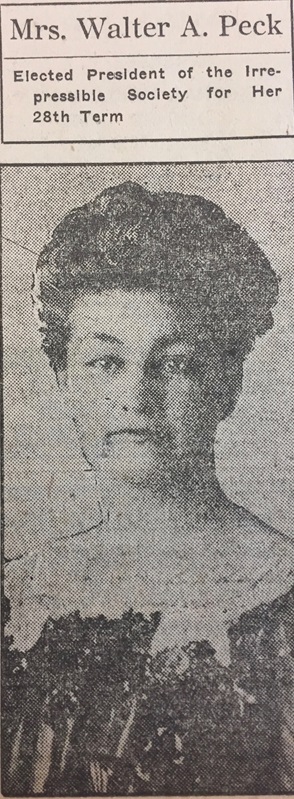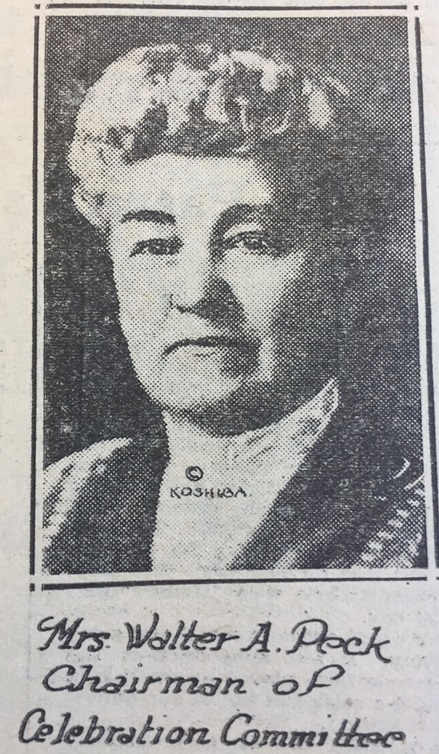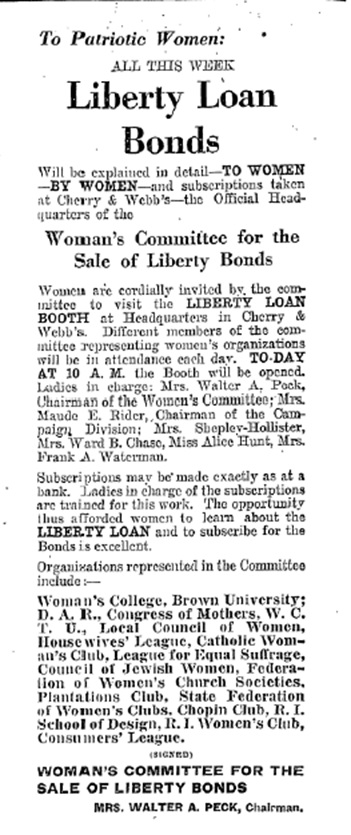Biographical Database of NAWSA Suffragists, 1890-1920
Biography of Louise (Mrs. Walter A.) Peck, 1856-1934
By Richard Aitchison, Undergraduate Student, Rhode Island College and Elisa Miller, Associate Professor, Rhode Island College.
Suffragist, Rhode Island Equal Suffrage Association; Officer, United League of Women Voters of Rhode Island; Community Activist; Prohibition Advocate
Louise Lyman Aborn was born on January 12, 1856 in Providence, Rhode Island to John Waterman Aborn and Julia Lyman Tillerhast Aborn. The family was descended from many famous Rhode Islanders, including Roger Williams, the founder of Rhode Island; one of the original settlers of Newport in the 1600s; several governors in the 1600s and 1700s; and Stephen Hopkins, a signer of the Declaration of Independence. Aborn graduated from the Rhode Island Normal School, which later became Rhode Island College, and worked as a teacher in East Providence, Rhode Island before getting married. In 1879, she married Walter A. Peck; they settled in Providence and had three daughters—Louise, Margaret, and Carolyn. Peck also descended from a prominent New England family with connections to the Massachusetts and Plymouth colonies. His father was founder of Asa Peck and Company, a successful wool dealing business, and Walter Peck worked for the family business. He died in 1901 and Louise Peck did not remarry.
Louise Peck belonged to the Congregational Church and emerged as a leading philanthropist and reformer in Rhode Island in the late nineteenth century. She helped found the Rhode Island Society for the Prevention of Cruelty to Children in 1882 and served on its board of directors from the 1880s to the 1930s. Peck also was elected president of the Irrepressible Society, a prominent organization in Rhode Island that offered social services for the community, such as providing employment to women in need and giving away clothing to poor families. She served as president of the organization for almost thirty years from the 1890s to the 1920s. She also supported philanthropic and reform efforts on behalf of working-class women as an officer of the Exchange for Woman's Work. In addition, she served on the board of directors of the Rhode Island Housewives League, an organized which wanted to make homemaking more efficient, scientific, and healthy through domestic science education and pure food legislation and the Churchill House Corporation, which managed a clubhouse that hosted meetings, events, and lectures for the Rhode Island Federation of Women's Clubs.
Peck was a college graduate and a supporter of women's education. In 1895, she joined a group of women in an effort to raise $75,000 to fund a building for women's education at Brown University. The committee's goal was to increase educational opportunities for women and to create a more coeducational institution merging Brown University and a mostly independent women's college. Peck also was a co-founder and a member of the board of directors of the Lincoln School, a private school for girls in Providence. In addition, drawing on her family background, Peck served as an officer of the Rhode Island branches of the Daughters of the Revolution and Society of Colonial Dames. With her extensive community involvement, Peck served in organizations and attended social events with prominent Rhode Island suffragists for many years.
The earliest record of Peck's active support for woman suffrage is 1916 when she helped host a meeting of the Rhode Island Equal Suffrage Association (RIESA) and served as a patroness for a RIESA event where Carrie Chapman Catt, president of the National American Woman Suffrage Association (NAWSA), was brought to Rhode Island to give a speech on woman suffrage. Peck also served as a patroness for a luncheon at a 1917 National Woman's Party (NWP) conference in Rhode Island. The purpose of the conference was to start a Rhode Island branch of the NWP and Alva Vanderbilt Belmont and Doris Stevens gave speeches. However, this event is the only record of any involvement by Peck with the NWP.
Peck's involvement with the Rhode Island suffrage movement intensified during World War I. She engaged in high-profile work in support of the war effort as state chairman of the Woman's Liberty Loan campaign to raise money for the war at a time when NAWSA and RIESA strongly supported woman's war work as good for the suffrage cause. Peck led an elaborate state campaign overseeing many districts and using tactics such as door-to-door canvasing, booths, advertisements, rallies, and lectures. An advertisement for Peck's liberty loan campaign in Rhode Island urged “patriotic women” find out more about the loan and the committee set up booths where the loans were “explained in detail—TO WOMEN—BY WOMEN.” In addition to RIESA, numerous other local organizations, including many in which Peck was active, supported the bond campaign, such as the Woman's College at Brown University, the Daughters of the Revolution, the Woman's Christian Temperance Union, the Housewives' League, and the State Federation of Women's Clubs to name a few. From 1918-1919 (records for 1917 were not submitted), Peck's campaign raised $12,184,105 in Rhode Island in support of the war effort. NAWSA publications, The Woman Citizen and The History of Woman Suffrage, highlighted Peck and other woman suffragists' patriotic efforts for the war and Peck was made an honorary vice-president of RIESA.
Peck attended the 1919 NAWSA convention in St. Louis, Missouri with several other Rhode Island suffragists and served on the national award committee at the convention for NAWSA's “Getting Out the Votes” contest. When she returned to Rhode Island, Peck gave a talk about the convention to the members of RIESA. In 1919, Peck also worked on a joint committee of RIESA and NWP members to host a mass meeting in honor of Dr. Anna Howard Shaw, a suffrage leader and the chairman of the national women's committee of the Council of National Defence.
Building on her suffrage work, Peck was a charter member of the Rhode Island League of Women Voters. She served on its board of directors, chaired its social committee, and attended the 1922 national convention in Baltimore, Maryland. In 1923, Peck and twelve colleagues attended the Ninth Congress of the International Woman Suffrage Alliance in Rome, Italy. Former NAWSA president, Carrie Chapman Catt, gave a speech about peace at Brown University in 1925 calling for women to be involved in the abolition of war around the world. After this event Peck hosted a reception for Catt and 250 guests at her home. On another occasion in 1925, Peck organized an elaborate three-day fundraising festival for the League that was held on the grounds of the Pecks' house. The Rhode Island League of Women Voters held an event in 1930 to celebrate the tenth anniversary of the woman suffrage amendment. Peck chaired the committee responsible for organizing the gala. In addition to her involvement with the League of Women Voters, Peck also was an active member of the Rhode Island Council of Women. As with many suffragists, Peck used women's new political power to lobby citizens and political parties about social issues in the 1920s. She spoke in opposition to a proposed 1927 law that would allow women to be exempt from jury duty. She explained to The Providence Journal that “If women want the privilege of serving on juries, they should regard it as a duty, the same as the men, and not ask for special consideration.”
In the 1920s, Peck emerged as a leading supporter of prohibition in Rhode Island. She was elected president of the Rhode Island Women's Committee for Law Enforcement, an organization devoted to protecting and enforcement anti-alcohol legislation. At the organization's national conference in 1924, Peck gave a speech in which she noted that Rhode Island was “one of the most important states financially and historically” but also one of the states where “the 18th amendment is least enforced.” She thought that prohibition was especially important for poorer Americans and testified at a Rhode Island legislative hearing that “prohibition has been a blessing to the poor, even if in some cases a curse to the rich.” She explained that anti-alcohol laws needed to be followed and enforced and that “perfect patriotism means obedience to the law.” Peck believed that women had a special duty in the defense of prohibition and urged women to work in the community to “build up confidence in the efficacy of the law.” Peck became strong advocate for Herbert Hoover during his 1928 and 1932 presidential campaigns due to his support for prohibition.
Louise Peck remained active in her community and political activities and organizations until her death at 76 years old on April 27, 1934 in Providence, Rhode Island.

“Mrs. Walter A. Peck,” The Providence Journal, October 30, 1923.

“Women Pioneers Honored,” The Providence Sunday Journal Magazine, March 16, 1930.

Liberty Loans Advertisement, The Providence Journal, October 23, 1917.
Sources:
Ida Husted Harper, ed. The History of Woman Suffrage, Vol. 6: 1900-1920 (New York: J.J. Little & Ives Company, 1922). [LINK]
Edith J.R. Isaacs, “Women and the Liberty Loans,” The Woman Citizen 3, No. 118 (September 28, 1917): 348-349.
National Woman's Liberty Loan Committee, Report of the National Woman's Liberty Loan Committee for the Victory Loan Campaign, April 21st to May 10th, 1919 (Washington, DC: Government Printing Office, 1920), 76-77.
Report of the National Convention of the Woman's National Committee for Law Enforcement, Held in Hotel Washington, April 10-11, 1924 (Boston: Woman's National Committee for Law Enforcement, 1924), 47.
The First Record Book of the Society of Colonial Dames in the State of Rhode Island, Ending August 31, 1896 (Providence: Snow & Farnham, 1897).
Lineage Book: The Society of the Daughters of the American Revolution, Volume 2 (Washington, DC: Daughters of the American Revolution, 1892).
“Exchange for Women's Work,” The Providence Journal, October 12, 1889.
“Daughters of the American Revolution,” The Providence Journal, February 23, 1894.
“The Woman's College,” The Providence Journal, February 10, 1895.
“Mrs. O.H.P Belmont Will Speak at Conference Here,” The Providence Journal, May 10, 1917.
Liberty Loans Advertisement, The Providence Journal, October 23, 1917.
“Women Organized for Liberty Loan,” The Providence Journal, March 29, 1918.
“Women's Committee Council of National Defense” The Providence Journal, October 13, 1918.
“Society,” The Providence Journal, March 23, 1919.
“Society,” The Providence Sunday Journal, May 4, 1919.
“Housewives League,” The Providence Sunday Journal, December 8, 1919.
“Mrs. Peck Will Attend Suffrage Session in Italy,” TheProvidence Journal, April 21, 1923.
“Officers Elected by Irrepressibles,” The Providence Journal, October 30, 1923.
“Mrs. Walter A. Peck,” The Providence Journal, October 30, 1923.
“Law Enforcement Objectives Made” The Providence Journal, May 10, 1924.
“Mrs. Catt Advises Prepare for Peace,” The Providence Journal, March 17, 1925.
“Local Women Take Trail to Richmond,” The Providence Journal, April 5, 1925.
“‘League Aid,' Big Lawn Fete, Opens,” The Providence Journal, June 12, 1925.
“Leaders Condemn Woman Jury Bill Exemption Clause,” The Providence Journal, February 10, 1927.
“Women to Campaign” The Providence Journal, September 15, 1928.
“Women Pioneers Honored,” The Providence Sunday Journal Magazine, March 16, 1930.
“Dry Speakers Ask Obedience to Law,” The Providence Journal, October 31, 1930.
“Sherwood Repeal Willed, Wets Say; Drys Fear Results,” The Providence Journal, February 6, 1931.
“Annual Affair held by O.E.S. Chapter” The Providence Journal, February 8, 1931.
“Service Tomorrow for Mrs. L.L. Peck,” The Providence Journal, April 28, 1934.
“Many Pay Tribute to Louise L. Peck,” The Providence Journal, April 30, 1934.
